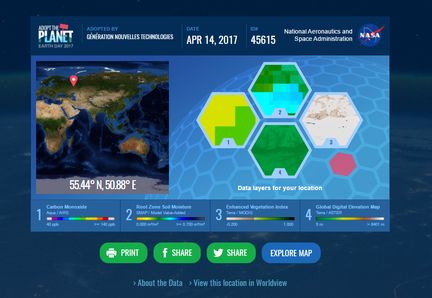For Earth Day, organized on April 22nd, NASA proposes to everyone to adopt a piece of our planet.
NASA has launched a campaign that allows everyone to virtually master one of the 64,000 pieces of land, forest, desert or ocean seen from space. The program launched on April 6 will be in place until April 22, officially declared "Earth Day". For Earth Day, organized on April 22nd, NASA proposes to everyone to adopt a piece of our planet.
NASA has launched a campaign that allows everyone to virtually master one of the 64,000 pieces of land, forest, desert or ocean seen from space. The program launched on April 6 will be in place until April 22, officially declared "Earth Day".
To appropriate one of these pieces of Earth, one must go to the dedicated site and enter its name. The pieces are then randomly distributed, each making an average of 88km wide.For NASA, it is above all an awareness campaign since the assigned track presents itself as an opportunity to learn more about the area in question.
NASA then shares its satellite data and various indicators, including carbon monoxide levels, cloud height, altitude, average temperatures, etc.
Source : NASA
suivre Dhaouadi Aymensur
💌 Follow by Email:Digital Channel
🌍🔍 Search Google :digitalchanneltv.tk
Click Index You Might Be Interested

